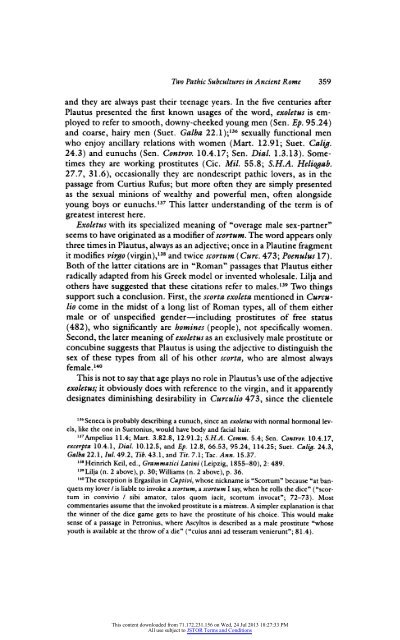Two Pathic Subcultures in Ancient Rome
Two Pathic Subcultures in Ancient Rome
Two Pathic Subcultures in Ancient Rome
Create successful ePaper yourself
Turn your PDF publications into a flip-book with our unique Google optimized e-Paper software.
<strong>Two</strong> <strong>Pathic</strong> <strong>Subcultures</strong> <strong>in</strong> <strong>Ancient</strong> <strong>Rome</strong> 359<br />
and they are always past their teenage years. In the five centuries after<br />
Plautus presented the first known usages of the word, exoletus is employed<br />
to refer to smooth, downy-cheeked young men (Sen. Ep. 95.24)<br />
and coarse, hairy men (Suet. Galba 22.1 );136 sexually functional men<br />
who enjoy ancillary relations with women (Mart. 12.91; Suet. Calig.<br />
24.3) and eunuchs (Sen. Controv. 10.4.17; Sen. Dial. 1.3.13). Sometimes<br />
they are work<strong>in</strong>g prostitutes (Cic. Mil. 55.8; S.H.A. Heliogab.<br />
27.7, 31.6), occasionally they are nondescript pathic lovers, as <strong>in</strong> the<br />
passage from Curtius Rufus; but more often they are simply presented<br />
as the sexual m<strong>in</strong>ions of wealthy and powerful men, often alongside<br />
young boys or eunuchs.'37 This latter understand<strong>in</strong>g of the term is of<br />
greatest <strong>in</strong>terest here.<br />
Exoletus with its specialized mean<strong>in</strong>g of "overage male sex-partner"<br />
seems to have orig<strong>in</strong>ated as a modifier of scortum. The word appears only<br />
three times <strong>in</strong> Plautus, always as an adjective; once <strong>in</strong> a Plaut<strong>in</strong>e fragment<br />
it modifies virgo (virg<strong>in</strong>),'38 and twice scortum (Curc. 473; Poenulus 17).<br />
Both of the latter citations are <strong>in</strong> "Roman" passages that Plautus either<br />
radically adapted from his Greek model or <strong>in</strong>vented wholesale. Lilja and<br />
others have suggested that these citations refer to males.'39 <strong>Two</strong> th<strong>in</strong>gs<br />
support such a conclusion. First, the scorta exoleta mentioned <strong>in</strong> Curculio<br />
come <strong>in</strong> the midst of a long list of Roman types, all of them either<br />
male or of unspecified gender-<strong>in</strong>clud<strong>in</strong>g prostitutes of free status<br />
(482), who significantly are hom<strong>in</strong>es (people), not specifically women.<br />
Second, the later mean<strong>in</strong>g of exoletus as an exclusively male prostitute or<br />
concub<strong>in</strong>e suggests that Plautus is us<strong>in</strong>g the adjective to dist<strong>in</strong>guish the<br />
sex of these types from all of his other scorta, who are almost always<br />
female. 140<br />
This is not to say that age plays no role <strong>in</strong> Plautus's use of the adjective<br />
exoletus; it obviously does with reference to the virg<strong>in</strong>, and it apparently<br />
designates dim<strong>in</strong>ish<strong>in</strong>g desirability <strong>in</strong> Curculio 473, s<strong>in</strong>ce the clientele<br />
136Seneca is probably describ<strong>in</strong>g a eunuch, s<strong>in</strong>ce an exoletus with normal hormonal levels,<br />
like the one <strong>in</strong> Suetonius, would have body and facial hair.<br />
'37Ampelius 11.4; Mart. 3.82.8, 12.91.2; S.H.A. Comm. 5.4; Sen. Controv. 10.4.17,<br />
excerpta 10.4.1, Dial. 10.12.5, and Ep. 12.8, 66.53, 95.24, 114.25; Suet. Calig. 24.3,<br />
Galba 22.1, Iul. 49.2, Tib. 43.1, and Tit. 7.1; Tac. Ann. 15.37.<br />
'38He<strong>in</strong>rich Keil, ed., Grammatici Lat<strong>in</strong>i (Leipzig, 1855-80), 2: 489.<br />
'39Lilja(n. 2 above), p. 30; Williams (n. 2 above), p. 36.<br />
'4OThe exception is Ergasilus <strong>in</strong> Captivi, whose nickname is "Scortum" because "at banquets<br />
my lover / is liable to <strong>in</strong>voke a scortum, a scortum I say, when he rolls the dice" ("scortum<br />
<strong>in</strong> convivio / sibi amator, talos quom iacit, scortum <strong>in</strong>vocat"; 72-73). Most<br />
commentaries assume that the <strong>in</strong>voked prostitute is a mistress. A simpler explanation is that<br />
the w<strong>in</strong>ner of the dice game gets to have the prostitute of his choice. This would make<br />
sense of a passage <strong>in</strong> Petronius, where Ascyltos is described as a male prostitute "whose<br />
youth is available at the throw of a die" ("cuius anni ad tesseram venierunt"; 81.4).<br />
This content downloaded from 71.172.231.156 on Wed, 24 Jul 2013 18:27:33 PM<br />
All use subject to JSTOR Terms and Conditions
















